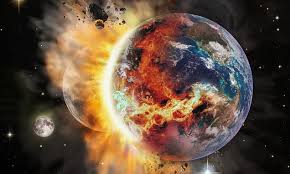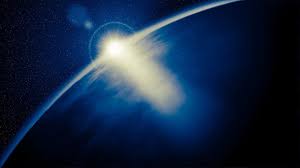Can Earth get out of the Solar System? A new research has given a dangerous solution
Scientists around the world are constantly trying to understand the mysteries of space, and now a new study has given a solution that seems like a sci-fi movie — but it is real. A research says that one day the Earth can either get out of its orbit or collide with another planet, or even get out of the solar system!
This amazing and thought-provoking study has been published in a journal named Icarus. According to studies, there is a chance that a “passing star” — that is, any other star that passes close to our solar system — could have such a gravitational impact that makes the entire system unstable.

What is a “Passing Star” and its effect?
Passing stars are those that come very close to a system while orbiting in space. If a star, whose mass is equal to our Sun, comes within 10,000 astronomical units (AU), then it can disturb the Oort Cloud. The Oort Cloud is the outer boundary of our solar system, from where comets also come.
These disturbances can not only alter the trajectories of comets, but can also alter the orbits of planets. Researchers Nathan Kaib and Sean Raymond say they carried out thousands of computer simulations and found that “passing stars” can cause Mercury, Pluto and even Earth to become unstable.
How much is the risk for Earth?
According to the research, the risk of instability in Mercury’s orbit increases by 50-80% if a passing star impacts. For Pluto, there is a 5% chance that its gravitational interaction will become chaotic.
And Earth? Even though the percentage may seem small, there is a 0.2% chance that Earth will either collide with another planet or be ejected from the solar system altogether. This means that Earth could become part of a cosmic billiards game – where gravitational forces push one planet out of orbit.
For Mars, there is a 0.3% chance that it will either collide with another planet or be ejected. All of this could happen over the course of the next 5 billion years.
What could be the worst-case scenario?
This simulation presented several shocking possibilities:
Mercury’s orbit is disturbed.
Mercury causes Venus or Mars to enter Earth’s orbit.
These planets collide with Earth – either there is a direct collision or Earth’s orbit changes totally.
Due to Jupiter’s powerful gravitational force, Earth is ejected like a “slingshot” – and we leave the solar system.
This scenario may sound thrilling, but the science behind it is completely solid and research-based. This is not a movie plot, but an actual probability, even if it is only 0.2%.

Should we be tensed?
Experts say this instability has a chance of happening within the next 4-5 billion years. So for now, we’re safe. But this study is a big reminder that our solar system isn’t always stable. It can change over time — and sometimes in unexpected ways.
The stability of Earth’s orbit depends on many factors — including the motion of other planets and unpredictable events in outer space, such as passing stars.
Finally, this study tells us that our solar system isn’t as predictable as we think. Without warning, the gravitational pull of a passing star can shake Mercury’s orbit, and the effect can reach Earth through a chain reaction. And in this way, we can either collide with another planet, or be ejected from the solar system by Jupiter’s slingshot effect.
So whenever you see stars in the sky next night, remember – one of them could move our world from its place in the future.
Tags: Earth Orbit Instability, Passing Star Threat, NASA Space Research, Earth Collision Risk, Icarus Journal Study
